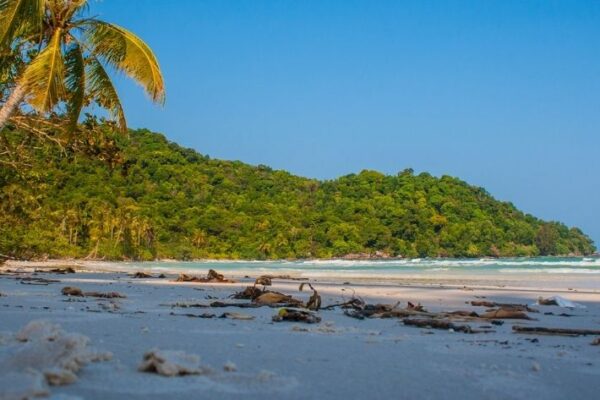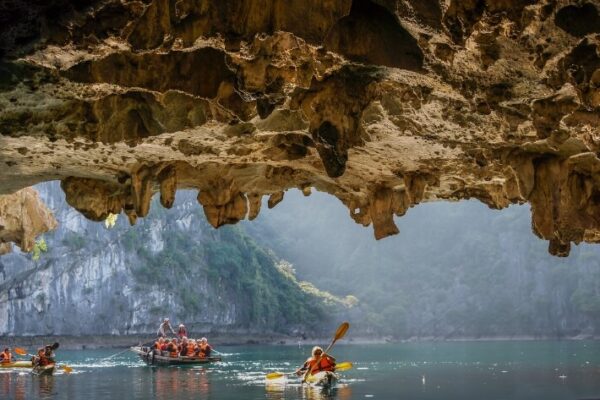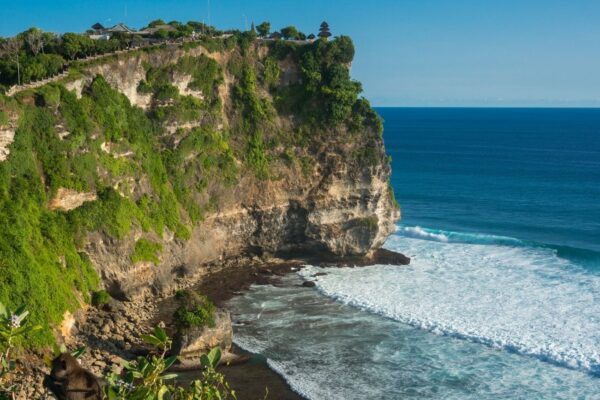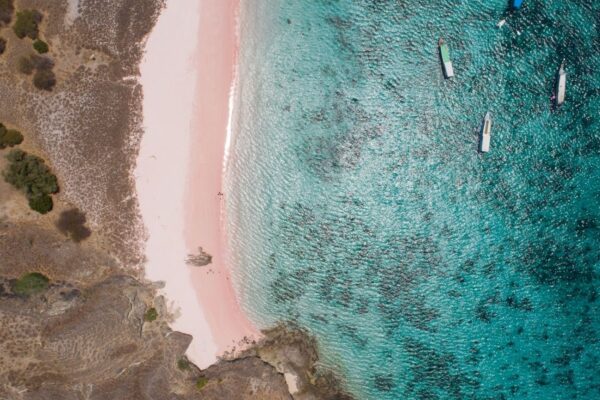Ecotourism in Bali: A Responsible Traveler’s Guide to Paradise
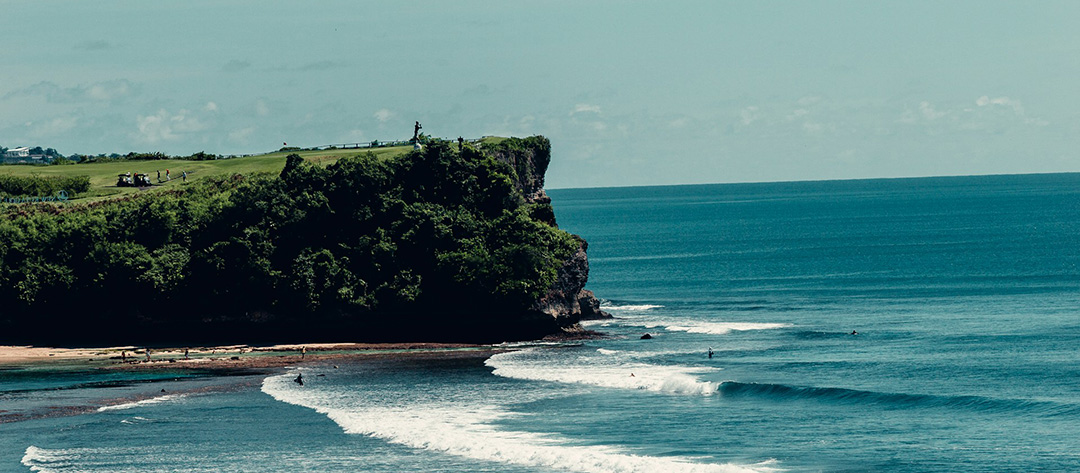
Bali, the Island of the Gods, conjures images of emerald rice paddies cascading down volcanic slopes, ancient temples shrouded in mist, and turquoise waters lapping against sun-drenched shores. For decades, it has been a sanctuary for travelers seeking beauty, culture, and spiritual renewal. But behind this idyllic postcard lies a fragile ecosystem and a unique culture under increasing pressure.
As its popularity grows, a crucial question emerges: how can we protect the very paradise we’ve come to admire? The answer lies in ecotourism in Bali—a mindful, immersive approach to travel that enriches the visitor, empowers the community, and actively preserves the island for generations to come.
Ecotourism in Bali and Its Effects
Opting for ecotourism in Bali is more than just a travel choice; it’s a conscious commitment to a sustainable future. This approach directly addresses the island’s most pressing challenges by creating a positive cycle of preservation and respect, ensuring that your visit has a lasting positive impact.
It begins with protecting a fragile environment. The explosion of mass tourism has placed immense pressure on Bali’s delicate ecosystems. The ancient Subak irrigation systems, a UNESCO World Heritage site, are threatened by the massive water demands of large resorts, while plastic waste is a visible scar on once-pristine beaches. Ecotourism counters this by supporting establishments that implement water conservation, manage their waste responsibly, and actively contribute to environmental clean-ups.
Furthermore, this conscious way of traveling champions the preservation of Bali’s authentic soul. Instead of promoting mass-produced souvenirs, it fosters a deeper appreciation for living culture. Your support can help fund a local village’s gamelan orchestra, sustain a family of traditional weavers, or ensure that sacred ceremonies are respected rather than commercialized.
This approach also ensures that your travel spending makes a real, tangible difference. It channels funds directly into the local economy, empowering families and entire villages. This is the heart of community-based tourism, where villagers themselves manage the visitor experience, ensuring that development is sustainable and that the benefits are distributed equitably. Ultimately, by choosing ecotourism, you are part of a powerful global movement. You join a significant and growing percentage of modern tourists who, according to Indonesia’s Minister of Tourism, wish to travel more sustainably and leave a lighter footprint.
Top Ecotourism Destinations in Bali
Ready to explore Bali’s green side? These destinations offer incredible experiences that are deeply rooted in the principles of conservation and community empowerment.
West Bali National Park (Taman Nasional Bali Barat)
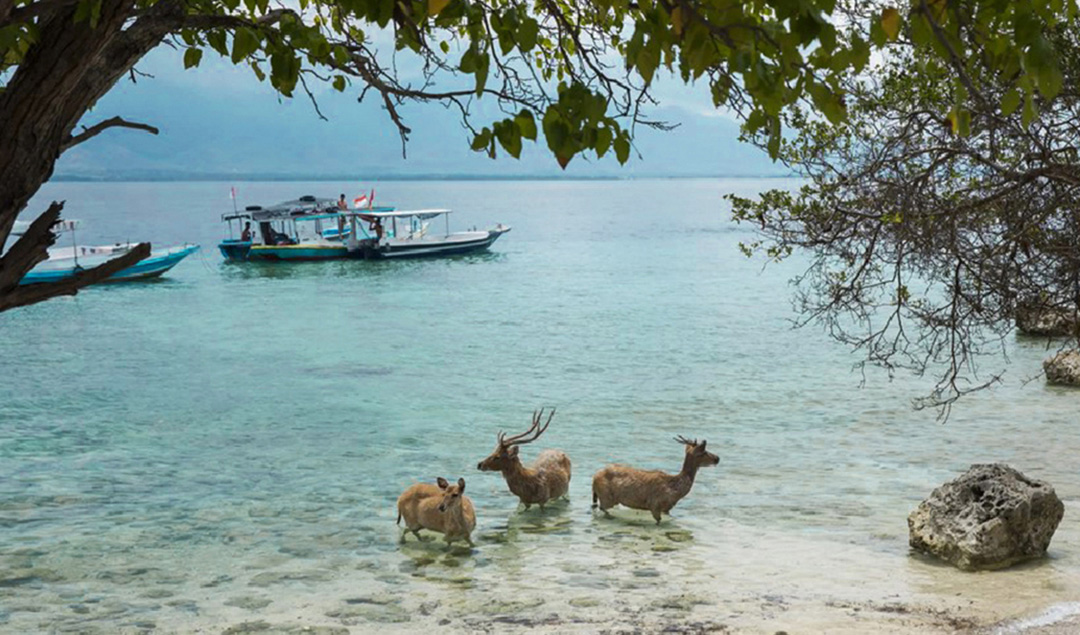
As Bali’s largest and most significant conservation area, this sprawling 190-square-kilometer park is a testament to the island’s raw, untamed beauty. It is a mosaic of diverse ecosystems, from dry savanna and acacia scrub to dense monsoon forests and lush mangrove swamps. This rich biodiversity makes it a crucial sanctuary for wildlife, including the critically endangered Bali Starling, the island’s iconic white bird that has become a symbol of conservation success.
While trekking, you might also spot wild boars, timid deer, or long-tailed macaques. The park’s protected status extends to its pristine coastline and the nearby Menjangan Island. Here, the calm, clear waters offer some of the best-preserved coral reefs in Bali, with spectacular wall diving and snorkeling opportunities where you can float above vibrant gardens of sea fans and encounter a dazzling array of tropical fish.
Mangrove Conservation in Denpasar (Taman Hutan Raya Ngurah Rai)
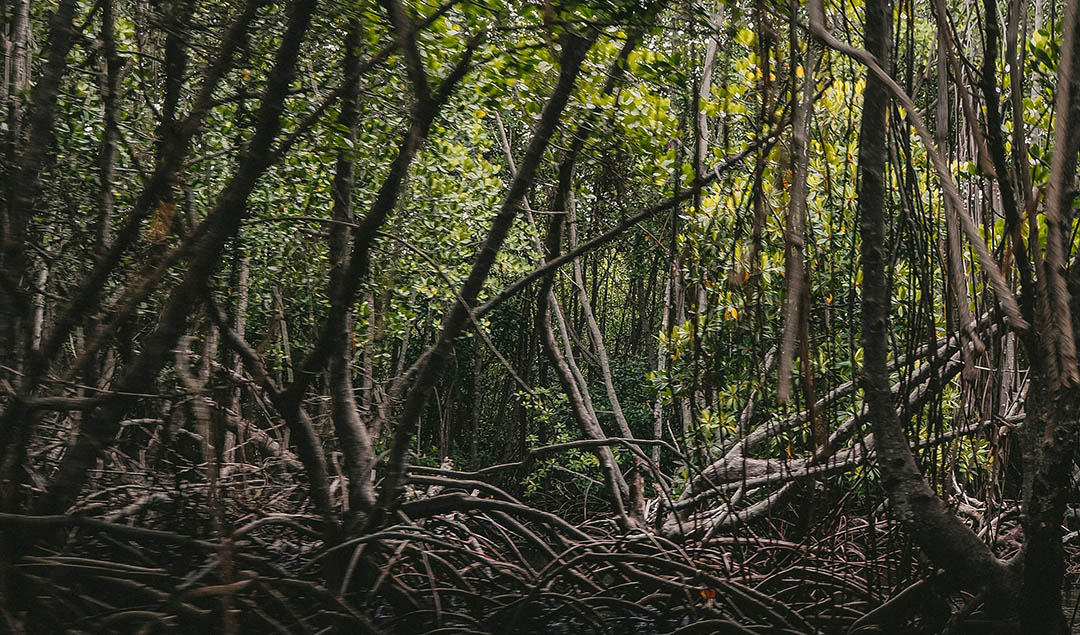
Just a stone’s throw from the bustling tourist hubs of southern Bali lies a serene and vital ecosystem: the Taman Hutan Raya Ngurah Rai. This 1,375-hectare mangrove forest offers a peaceful escape and a powerful lesson in environmental science.
Visitors can wander along extensive wooden boardwalks that snake through the dense canopy or take a guided canoe tour through the tranquil waterways. This immersive experience provides deep insights into the crucial role of mangroves as “blue carbon” sinks, ecosystems that are exceptionally efficient at absorbing and storing atmospheric carbon.
You will learn how these remarkable trees protect the coastline from erosion, act as a natural filter for pollutants, and serve as a crucial nursery for countless species of fish, crabs, and birds.
Mount Batur Geopark & Kintamani Villages
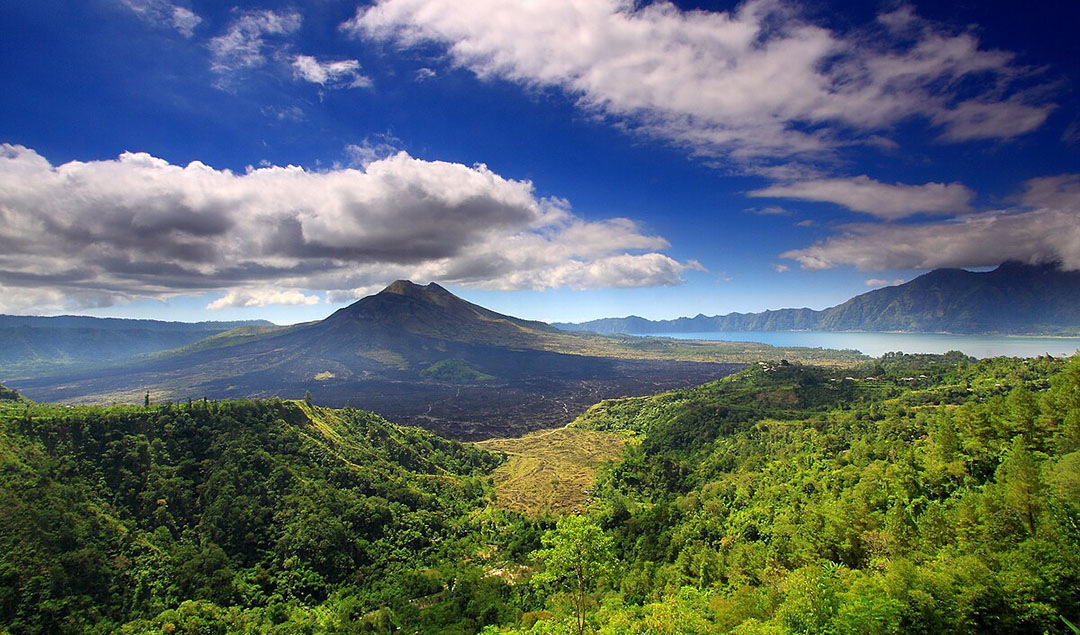
Recognized by UNESCO for its global geological significance, the Mount Batur Geopark offers a dramatic landscape shaped by millennia of volcanic activity. The centerpiece is the vast double caldera, with the active volcano of Mount Batur rising from its center alongside a stunning crescent-shaped lake.
Beyond the famous sunrise trek to the summit, the area is a prime example of geotourism, where you can explore unique lava fields, relax in natural hot springs heated by the earth’s core, and learn about the region’s powerful geology.
To fully appreciate the area, venture into the surrounding Kintamani villages. You can experience community-based tourism firsthand by staying with local families and learning about their agricultural heritage. This region is famous for its high-quality Kintamani coffee, which holds a protected geographical indication. Visiting a local plantation for a tasting directly supports the farmers who cultivate these prized beans.
Nusa Lembongan, Ceningan & Penida: Marine & Community Conservation
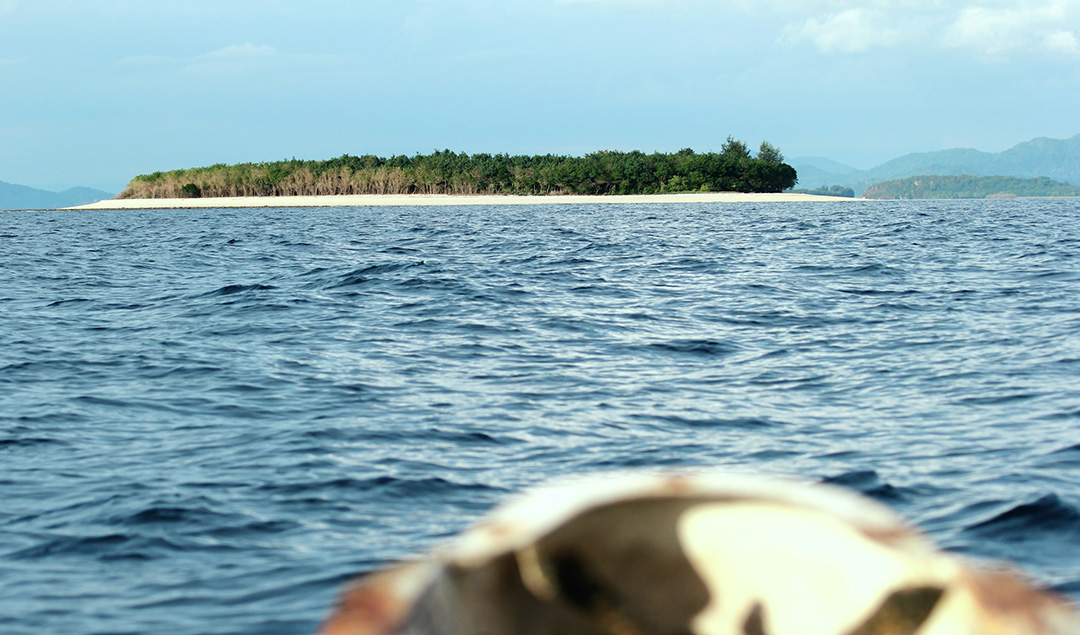
The three Nusa Islands, a short boat ride from Bali’s southeast coast, are a haven for marine conservation and sustainable community livelihoods. Together, they form a Marine Protected Area (MPA) dedicated to preserving coral reefs and iconic species like the majestic manta ray and the seasonal mola-mola (sunfish).
On Nusa Lembongan and Ceningan, you can witness the traditional practice of seaweed farming, a sustainable form of aquaculture that has supported local families for generations. You can participate in community-run mangrove restoration tours or go snorkeling and diving in carefully managed, coral-friendly zones. These initiatives are proudly led by locals who are deeply committed to protecting the marine environment, offering an inspiring model of how tourism can directly support conservation goals.
Lake Buyan & Munduk Eco-Villages
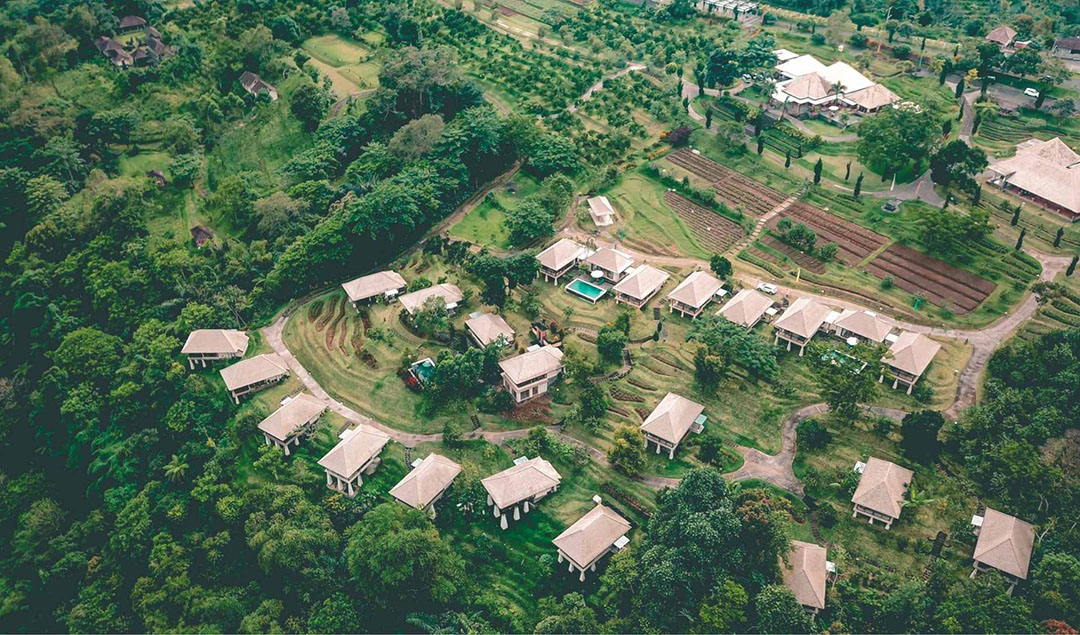
For a refreshing change of pace, head to the cool, misty highlands of North Bali to discover the twin lakes of Buyan and Tamblingan, often referred to as the “untouched heart of Bali.”
The surrounding area, particularly the village of Munduk, is a pioneering center for ecotourism. Here, the cooler climate and fertile volcanic soil create a lush agricultural landscape. You can trek through plantations heavy with the scent of cloves, vanilla, and robusta coffee, learning about the crops that have sustained the region for centuries. The area is dotted with spectacular waterfalls, like Munduk and Melanting, which cascade into cool, swimmable pools.
The best way to experience this region is by immersing yourself in local life through community-based homestays, which offer an authentic and respectful taste of rural Balinese culture.
Practical Tips for the Responsible Traveler
Embracing ecotourism is about making conscious choices, big and small, that weave responsibility into the fabric of your journey.
Being a responsible traveler begins with where you choose to stay and who you book with. Seek out eco-certified hotels or guesthouses that can demonstrate their commitment to sustainability, for example, through water recycling systems, a ban on single-use plastics in rooms, or sourcing produce from their own organic gardens. This mindful spending should extend to supporting the local economy directly. Choose to eat at family-owned warungs and shop at local markets instead of large supermarkets; the flavors are more authentic, and your money directly supports a family.
Your daily actions are just as important. The fight against plastic waste is critical in Bali, so carry a reusable water bottle—apps like RefillMyBottle can show you hundreds of refill stations across the island. Similarly, a reusable tote bag is essential for shopping. Equally important is showing deep respect for the local culture. Bali is a deeply spiritual place, so always dress modestly when visiting temples (sarongs are usually available for rent), use only your right hand to give or receive items, and never touch someone’s head. Be mindful of the small, daily Canang Sari offerings on the ground and avoid stepping on them.

Consider embracing a slower pace of travel. Instead of rushing between sights in a private car, explore a neighborhood on foot or rent a bicycle to tour the countryside. This not only reduces your carbon footprint but also opens the door for spontaneous, authentic interactions with local people. Finally, you can give back tangibly by looking for opportunities to join a beach clean-up organized by reputable NGOs like Trash Hero, or by supporting local initiatives like Bye Bye Plastic Bags.
An Example in Action: The “Highlights of Bali and Nusa Islands” Experience
For travelers seeking an authentic and nature-centric journey, a well-structured itinerary can make all the difference. One prime example of an eco-conscious adventure is the ”Highlights of Bali and Nusa Islands” tour, a 6-day exploration that perfectly encapsulates these principles.
Route
The journey begins in the spiritual heart of Bali, Ubud, before venturing across the sea to the pristine Nusa Islands. The tour concludes on the serene beaches of Jimbaran, offering a comprehensive glimpse into Bali’s diverse landscapes.
Duration
This thoughtfully paced 6-day tour allows for genuine immersion without rushing, a key principle of sustainable travel. It provides ample time to connect with each location, appreciate the environment, and support local communities along the way.
Why This Itinerary Embodies Balinese Ecotourism
While not explicitly labeled as an “ecotour,” this itinerary is perfectly suited for the eco-conscious traveler for several reasons:
- Focus on Natural Immersion: By starting in Ubud, travelers are immediately surrounded by lush rice terraces and dense jungles, areas central to Bali’s ecosystem. The journey to the Nusa Islands shifts the focus to marine conservation, highlighting the importance of coral reefs and aquatic biodiversity through activities like snorkeling and diving in protected waters.
- Supporting Local Economies: Traveling from the cultural hub of Ubud to the less-developed Nusa Islands and the fishing village of Jimbaran ensures that tourist spending is distributed across different communities. This model supports local guesthouses, boat operators, and family-run warungs (eateries), empowering residents and providing an authentic cultural exchange.
- Promoting Low-Impact Activities: The core activities of this itinerary are inherently eco-friendly. Exploring Ubud’s rice fields on foot, cycling through villages, snorkeling in the Nusa Islands, and enjoying a sunset on Jimbaran beach are all low-impact experiences that encourage a deep appreciation for Bali’s natural beauty without degrading it.
- Educational and Cultural Value: Ecotourism is also about education. This route offers a profound learning experience, from understanding the ancient Subak irrigation system in Ubud’s rice paddies to observing traditional seaweed farming on the Nusa Islands. It fosters a connection to the land and the culture that depends on it, creating more responsible and mindful travelers.
This itinerary beautifully embodies the principles of Balinese ecotourism. Its focus on natural immersion is clear, its support for diverse local economies is woven into every stop, and its promotion of low-impact, educational activities is central to the experience. By choosing a journey like this, travelers are not just seeing Bali; they are actively participating in its preservation.
>> See Tour: Highlights of Bali and Nusa Islands
As we’ve explored, ecotourism in Bali offers a pathway to a richer, more authentic travel experience that honors the island’s precious environment and vibrant culture. From understanding the reasons to travel responsibly to discovering key destinations and practical tips, the power to make a positive impact is in your hands.
For an immersive journey thoughtfully designed to support local communities and showcase the best of Bali’s natural beauty, we invite you to explore the sustainable travel options with Asia Pioneer Travel. Let us guide you on an unforgettable adventure that not only creates lasting memories but also contributes to the preservation of this unique paradise for future generations.

